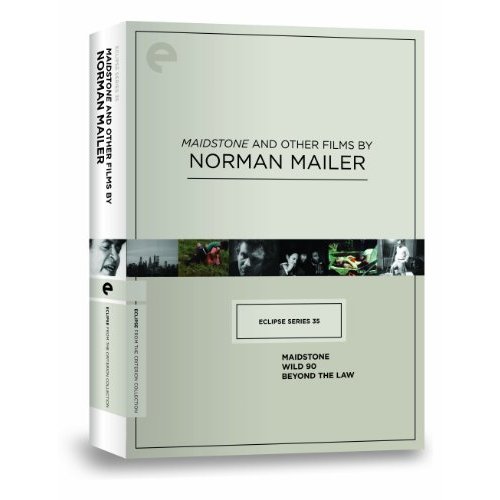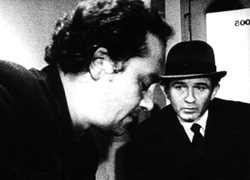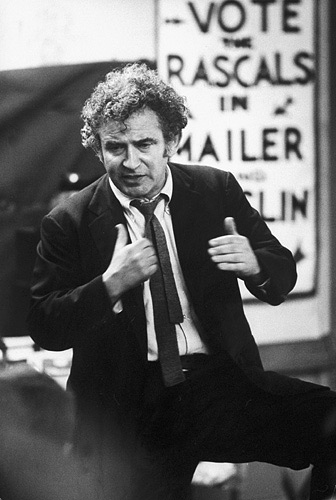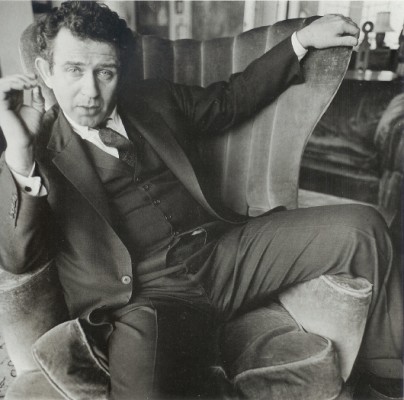From Monthly Film Bulletin, September 1975, Vol. 42, No. 500.
It’s good to see Norman Mailer’s first three features just out in a two-disc DVD set from Eclipse (it would be great if Criterion could eventually do the same for Susan Sontag’s three fiction features), even though I regret that my two favorite Mailer films — his untitled, ten-minute experimental short from 1947 (recently discovered by archivist Michael Chaiken, who wrote the excellent and provocative notes for the Eclipse set, and which I saw last July at Il Cinema Ritrovato) and Tough Guys Don’t Dance (1987) — aren’t included. (Admittedly, I haven’t yet seen all of Maidstone, which Chaiken makes the most claims for, so these rankings on my part are still subject to revision.)…In his Eclipse notes, Chaiken describes Will the Real Norman Mailer Please Stand Up? [sic] as “a filmed counterpart to The Armies of the Night“, which parallels my own observation here. — J.R.
Will the Real Norman Mailer Please Stand Up
Canada, 1968
Director: Dick Fontaine
Dist—The Other Cinema. p.c–Allan King Associates. For National
Educational Television, British Broadcasting Corporation, Canadian
Broadcasting Corporation, Bayerischer Rundfunk. exec. p–Allan King,
Roger Graef. p/sc—Dick Fontaine. ph–Richard Leiterman. In colour.
ed—Stephen Milne. Song–“The Eve of Destruction” by and sung by
Bob Dylan. sd–Russel Helse, Mike Billing. p. assistants–Jeffrey Edward,
Gwen Gillie, Judith Marriott, Mark Peploe, Toni Trow. with–Norman
Mailer, James Toback, Robert Lowell, Dwight Macdonald, Beverly
Bentley, Merv Griffin, Barry McGuire. 2,182 ft. 61 mins. (16 mm.).
Norman Mailer is presented in a series of his public roles, each
identified by a superimposed title and intermixed with verbal and
visual snatches of Barry McGuire, a fast-talking Washington disc
jockey who occasionally alludes to the ‘media events’ featuring
Mailer. THE NOVELIST: Mailer is interviewed on TV by James
Toback after the publication of Why Are We in Vietnam? and talks
about modern heroes. THE DIRECTOR: He prepares a line-up
scene in his film Beyond the Law. THE ACTOR: He performs in the
scene. THE ACTOR & HIS WIFE: A different sequence in the
finished film, with Mailer and his wife Beverly Bentley quarreling
in a restaurant. THE CITIZEN: Mailer addresses a group of draft-
card burners in Washington prior to the October 1967 March to the
Pentagon. THE MASTER OF CEREMONIES: Drunk on bourbon, he
imitates Lyndon Johnson and introduces Robert Lowell at a rally
before the march; this is followed by a brief quote from Time
Magazine’s coverage of the event. An untitled sequence details
Mailer’s participation in the march itself and his subsequent
voluntary arrest. VIRGINIA — THE STATE PENITENTIARY:
Mailer emerges from prison and is questioned by reporters. THE
PREACHER: He concludes his statement by dictating a “sermon”
about Jesus Christ and the war in Vietnam to the journalists; later
he reads the Washington Post‘s coverage of this speech. THE
CELEBRITY: He appears as a guest on The Merv Griffin Show,
introduced as the author of What Are We Doing in Vietnam?, and
proceeds to deliver a heated denunciation of the war; in a bar, men
are shown watching the TV programme and then making semi-
coherent comments about Mailer after one of them angrily
disconnects the set.
A uniquely valuable document and educational tool, Dick
Fontaine’s carefully crafted portrait of Norman Mailer in 1967-8
offers at once an essential companion piece to Mailer’s book The
Armies of the Night and an intriguing contrast to Godard and
Gorin’s Letter to Jane — with which it might make a fruitful double-
bill — in its broaching of questions about the role of intellectual
media figures in protesting U.S. involvement in Vietnam. From
‘THE CITIZEN’ onwards, all the episodes described above receive
independent treatment in Mailer’s book; and because both book
and film are concerned with the impact and distortion of events in
and through the media, a dense and ambiguous interplay is set up
between the versions offered by (1) the media, in the form of TV
appearances, radio announcements and newspaper and magazine
coverage, much of which is cited by book and film alike, using the
same examples, (2) Mailer’s alternate reports in the book of his
speeches and the various events, and (3) the film’s own rendering of
the above phenomena, which often differs sharply from (1) and (2).
For one thing, Fontaine has altered the chronology of some events-
the filming of Beyond the Law occurred after the Pentagon March,
not before, and the evening rally preceded rather than followed
Mailer’s address to the draft-card burners — and has apparently
staged certain others (Mailer reading the Washington Post, the
barroom conversation, a few of McGuire’s interjections). On the
other hand, many of the actual speeches delivered by Mailer in the
film come across quite differently from either the media or the Mailer
reports of them, in detail as well as in overall effect, suggesting how
readily one man’s documentary can become another man’s
confection. A particularly ironic aspect of the film’s title is the fact that
the “real Norman Mailer”, i.e. the writer — the single role which
makes all the others possible or plausible — is the role to which
film and media seem least attentive: Why Are We in Vietnam? is
used as a topical launching pad in one TV appearance, the title is
blithely mangled in another, and The Armies of the Night (which
presumably appeared after the film was completed) is not mentioned
at all. In terms of the contrasts implied by Fontaine’s arrangement
of events, Mailer appears in turn pompous, modest, stupid, brilliant,
blustering, graceful, incoherent and eloquent from one sequence to
the next, like a perpetually developing fictional character. As in The
Armies of the Night, a concentrated focus on these juxtapositions
effectively renders the Vietnam war peripheral, or at any rate
secondary to the issue of how a famous author bears witness to it: “I
wasn’t Lyndon Johnson’s alter-ego for nothing” Mailer remarks on his
way out of jail, neatly fusing his solipsism with the film’s own media
conceits (while Fontaine alternately links him with the disc jockey
McGuire). All this transpires under the late Sixties spell of Marshall
McLuhan, which guarantees a perpetual confusion between
diagnosis and symptom. (It is worth noting that Will the Real Norman
Mailer Please Stand Up was made for TV networks in four countries,
and is thus an integral part of the pop media it describes.) Yet taken
in conjunction with Mailer’s book it offers a fascinating
demonstration of how all versions of an event — no matter how
conscientious or ‘truthful’ — are none the less versions, and potential
grist for any number of independent mills.
JONATHAN ROSENBAUM






